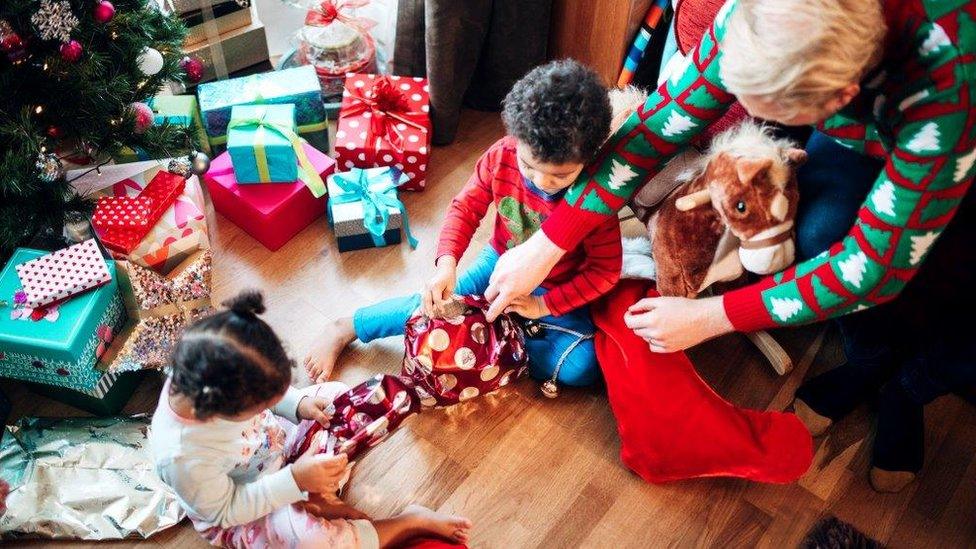Nine lessons for a happy family Christmas
- Published

From the Christmas Eve inter-sibling skirmish to reverting to your teenage self and scrapping over the TV remote on Christmas Day, the annual festivities all too often put family relationships on edge.
So, when the weather outside is frightful, how do you keep home life delightful and stop the Christmas spirit turning sour?
1. Ease the Christmas crush

Going home for Christmas is great - but when you get there, will you be sleeping in your old teenage bedroom - maybe along with your partner and kids?
"Even if we're busy at work or at home, we have time alone don't we?" says Relate, external counsellor Dee Holmes.
But at Christmas people are often "forced too much into each other's space".
"If you've got a houseful of relatives, there's always something to be done or someone who wants to talk to you.
"Children are used to having time when their parents ignore them, in front of the telly... and suddenly: 'Aunty Freda's here, let's play a game...'"
So appreciate that your nearest and dearest need some space and that having a happy family Christmas doesn't mean you all want to be together 24/7.
Instead of expecting everyone to join in every moment of Christmas Day, maybe agree some key times, like opening presents and Christmas lunch, but otherwise be flexible, she suggests.
2. Don't be a kitchen martyr

Let's face it, Christmas catering is really hard work.
And even if you prepare as much as you can in advance, timing a roast to perfection is a fine art - and if it goes wrong, can result in overcooked veg, cold turkey - and a large helping of stress.
So if you're the designated cook, don't be afraid to ask for help, says Dee.
"Make sure there's a bit of a rota about people all helping and everyone mucking in."
It's important everyone has some downtime - including the cook, she says.
And if cooking at home is just too much of a stress point, Kim Moore, a mental-health expert at Birmingham City University, advocates considering going out to eat.
3. Whose Christmas?

"There's the child-centred Christmas and there's the adult-centred Christmas - and sometimes, in a family environment, they clash," says Dee.
Danger points abound where different generations are forced into close proximity, she warns - from sleepy teens woken before it gets light by their over-excited younger cousins or people without children annoyed if they have to open all the presents before breakfast, to the adults who are drunk before it gets dark and argue heatedly about politics.
"Another big thing is how people revert to their traditional roles in the family when they all get back together," Dee says.
"So you know you live the rest of the year being a successful professional person or you're doing your own thing and as soon as you get home, you're the youngest one or the naughty one."
This sort of stereotyping is a big cause of Christmas rows, says Dee, who urges family members to cultivate tolerance, empathy and "a bit of sensitivity to other people's expectations".
4. A Christmas truce
Agreeing ground rules on subjects to avoid over Christmas can be a really good idea, says senior mental-health nursing lecturer Kim.
In addition it's wise to try to resolve in advance any outstanding issues between family members which could lead to rows on the day, she advises.
"Try just to be respectful of the other people," adds Dee. "And if you want to have an argument with someone, is today really the day?
"If someone said something that annoys you, maybe you say, 'I'm just going to ignore that for now.'"
5. The remote and other technology

Remember the days when there was one TV in the corner of the sitting room and the rows over channel choice?
The good news is that those days are long gone and everyone with a phone can potentially choose when and how to watch whatever they like.
So the traditional arguments over who controls the remote are less problematical, says Dee.
But she warns adults who want to recapture possibly fictitious past family Christmases, where everyone sat down to watch Doctor Who together, are unlikely to succeed.
And then there's the problem of prising teens away from their phones.
"If you spend all year with your teenagers in their bedrooms... don't have unrealistic expectations of family life being suddenly different because you wake up and it's Christmas morning," warns Dee.
"Don't expect a miracle."
6. Christmas karaoke?

Music is a great way of bringing families together and making everyone feel better, says Kim.
Karaoke or just pass the parcel to Christmas songs can be "a great way to engage all family members from young to old" and create some fantastic memories, she says.
Alternatively, you might prefer charades or board games - but beware the Christmas scrabble row.
Some families choose to go for walks on Christmas or Boxing Day but Dee says a relaxed family Christmas often depends on not expecting everyone to join in with everything.
"Just because you have a ritual and you've always gone on a walk after the Queen's speech doesn't mean you always have to keep doing it."
7. The spending trap
The urge to overspend at Christmas can be enormous, with families targeted by massive marketing campaigns months ahead.
January is a tough month, too often made worse by credit card bills and overdrafts, so managing spending and expectation in the run-up to Christmas is key, says Dee.
"I think it's important to talk about what the limitations are, what the budgets are."
More and more families are choosing to discuss Christmas gift budgets with their children, she says, even when they're quite young.
"It's not about saying we can't afford it... or making them scared that you've no money, or anything like that, but being realistic."
And try to make gifts "fair", she says.
"Children will soon pick up if they feel there's an unfairness."
8. Stay safe
Christmas is meant to be a fun time so it is particularly tough when it goes wrong, throwing family problems into stark focus.
More people contact Relate for relationship counselling in the weeks after Christmas than at any other time of year, says Dee.
If disagreements spill into violence, Kim says not to be afraid to ask for help, even if this means calling the police. And if you fear for your safety, organisations such as Women's Aid , externaland Men's Advice Line, external also offer advice.
9. Dry January? Consider starting early

If you're worried about fuelling family rows over the festive season, why wait until January to go teetotal?
"The use and overuse of alcohol can be a major trigger of family discontent over Christmas," Kim warns.
Dee adds that the best-laid plans and intentions can all too easily be forgotten when you've had a few - tolerance and sensitivity can go out of the window and it's all too easy to say the wrong thing, with minor disagreements becoming full-blown family bust-ups.
"I have certainly heard some horror stories," she says.
Dee says it's really important to make sure drinkers have plenty to eat - and rather than banning booze altogether, she suggests spritzing wine and making bucks fizz with your champagne or prosecco, with plenty of suggestions available online, external for non-alcoholic festive drinks, external to lightly enhance feelings of goodwill to all - even your siblings.